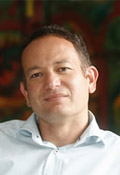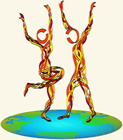Visiting Fellows
 |
Michelle H. Raheja is Associate Professor in the Department of English and Director of the California Center for Native Nations at the University of California, Riverside. Of Seneca descent, she focuses her research and teaching on early American literature and Native American cultural studies and theory. Her book, Reservation Reelism: Redfacing, Visual Sovereignty, and Representations of Native Americans in Film (2011) won the first annual Emory Elliott Book Award. During her time as a fellow of the Indigeneity project in 2012, Michelle examined the work of a turn-of-the-twentieth century queer Native American circus performer and delivered a keynote presentation at the team’s London symposium. She has been a cultural advisor to the EcoCentrix exhibition and is also co-editor for In the Balance: Indigeneity, Performance, Globalization, with Helen Gilbert and Dani Phillipson. |
 |
Freelance composer, researcher and consultant Te Ahukaramu Charles Royal worked at the University of Auckland as Professor of Indigenous Development and served as Director of Ngã Pae o te Mãramatanga, one of New Zealand’s eight centres of research excellence, from 2008 to 2014. He has an abiding interest in the creative potential of indigenous knowledges and has written and/or edited six books on aspects of traditional Mãori culture, tribal histories and traditions. Charles is the founder of the modern Whare Tapere, a cultural theatre and performing arts project based on his doctoral and master’s research and first achieved in 2010 within his tribal community in Aotearoa/New Zealand. While visiting the Indigeneity project in 2011, he gave research presentations in London and Paris, and subsequently contributed to discussions about the educational DVD arising from the project. |
 |
Ocean Ripeka Mercier (Ngãti Porou, PhD) lectures at the School of Mãori Studies, Victoria University of Wellington. Her research includes a project on filmmakers’ experiences in the New Zealand 48 Hour Film Competition, Kaupapa Mãori readings of film, audio commentary as text and methodology, and the impact of digital mapping and place-based pedagogy on (Mãori) student engagement. Ocean joined the Indigeneity project on her first sabbatical in 2012 to explore concepts for analysing her interviews with filmmakers and has published some of her findings in journal articles. She also edited a special issue of New Zealand Journal of Media Studies on Taika Waititi’s Boy, contributed to the end-of-project symposium on indigeneity, performance and globalization, and was a cultural advisor to the EcoCentrix exhibition. |
 |
Peter Morin is a Tahltan Nation artist, curator and writer from British Columbia. His practiced-based research, defined by Tahltan epistemological production, investigates encounters between indigenous culturally-based practices and western settler colonialism, often taking on the form of performance interventions. Peter has participated in numerous exhibitions and performance events including World’s Large Bannock Attempt (2005), 12 Making Objects A.K.A First Nations DADA (2009) and This is What Happens When you Perform the Memory of the Land (2013). He has also curated exhibitions in Western Canada, including Carrying on Irregardless: Humour in Contemporary Native Art for the Bill Reid Gallery in Vancouver. As a visiting fellow on the Indigeneity project in 2013, Peter developed a series of ‘cultural graffiti’ performance interventions that were documented for exhibition at EcoCentrix. He joined the Visual Arts Faculty at Brandon University in 2014 and has contributed to an article in Unesco e-journal on his London work, in dialogue with Helen Gilbert and Dani Phillipson. |
|
|
